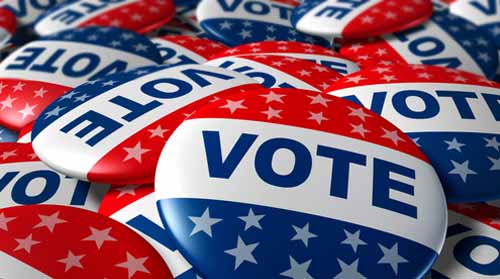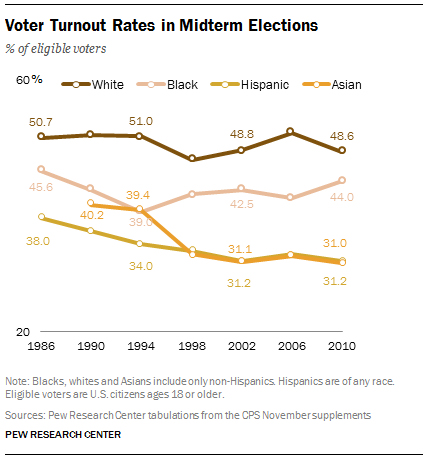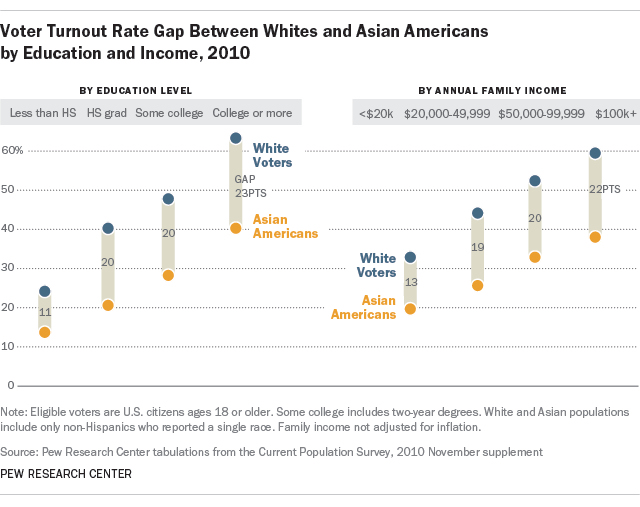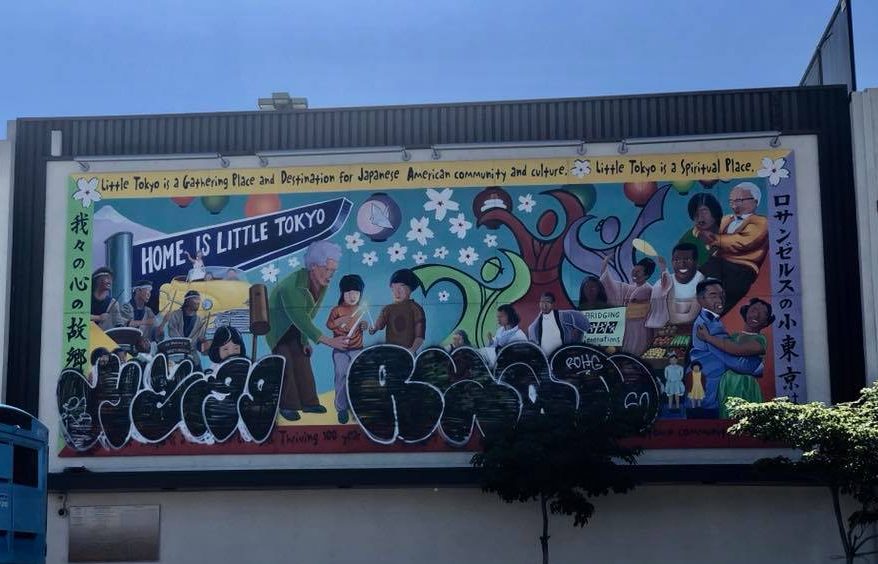
2014 is turning out to be another critical mid-term election year, with most analysts predicting huge losses for the Democrats in both the House and the Senate. Whatever changes are made to the political distribution of Congress will critically impact the final two years of the Obama Administration: an administration that has been largely hamstrung in pursuing all of its major policy initiatives by obstinate and obstructive Republicans. Should the trend of Democratic losses in Congress continue, it could seriously hamper the chances that any real work will be done in the next two years in the Capitol.
Consequently, attention is focusing once more towards the electorate, and various voting groups. Asian Americans have routinely been cited as a growing swing electorate, one that I suggested made a significant impact in the outcome of the 2012 election. This year, Asian Americans — who make up about 4% of registered voters — could once again swing the election.
However, last week, the Pew Research Center published a report suggesting that compared to other minority groups, Asian Americans have the lowest voter turnout, at just 31%. And more disturbingly, our voter turnout rates have seriously declined in the last 20 years, compared to turnout rates of White and Black voters, which have remained stable or which have risen slightly.

Pew Research Center notes that these low voter turnout numbers are consistent regardless of nation of birth; both recent immigrants (which make up 74% of eligible Asian American voters) and native-born Asian Americans turnout to the polls at roughly 31%.
So what explains these low voter turnout rates (assuming, of course, that we believe these data)?
One reason could be the relatively smaller distribution of Asian Americans who are 65 years of age or older (9.6% of Asian Americans are 65+ compared to 12% for the national average); that’s at least in part because Asian Americans are still experiencing a large population boom through immigration, and immigrants tend to still be of working age. Elderly or retired Americans are more likely to turn out to the polls compared to their younger counterparts, due in part to the difficulties of voting on a Tuesday; thus, the relatively smaller population of elderly Asian Americans in this country could impact our voter turnout. Indeed, when Pew asked Asian Americans their reasons for not turning out to vote, the most frequently cited reason — 37% of those polled — was being “too busy due to work or school”.
Yet, this reason can only be part of the answer, as evidenced by the nearly 20 point gap in voter turnout between White and Asian American voters when compared by both education level and income level, socioeconomic factors that typically result in similar employment status between White and Asian American workers. Highly-educated voters tend to be more likely to vote, yet even among the most well-educated Asian American voters, voter turnout still lags by 23% compared to White voters; similar trends are observed by median family income.

Instead, these data suggest that other obstacles are preventing or discouraging Asian Americans from participating in the American electoral process.
At least some of these reasons are obvious. With 74% of Asian American voters being foreign-born, language barriers at the polls remains an ongoing barrier towards voting for many non-English-speaking voters. Many Asian American voters are unaware of their rights as voters to have access to Asian-language ballots and/or a translator; expectation of language barriers may discourage some Asian Americans from coming out to the polls.
Additionally, Asian Americans may be less invested in a political process that may superficially fail to include them. Despite our ongoing underrepresentation at the highest echelons of American government, Asian American candidates are still rarely visible and struggle to obtain support from Democratic or Republican party leadership as viable candidates. For Asian Americans, absence of an Asian American candidate for local or higher office may dampen enthusiasm for turning out. This year, only one major Congressional race features Asian American candidates — the hotly-contested primary run-off between Representative Mike Honda and challenger Ro Khanna.
Finally, many Asian American voters live in California and New York City, and a small majority are registered Democrat. Thus, most Asian American voters are focused in two heavily blue states, where a Democratic vote may be perceived as being “less impactful”, because the state is likely to swing Democrat anyways; this can further reduce voter turnout.
But, in truth, none of these reasons are very good reasons for not turning out to the vote. Asian Americans, like all Americans, are part of the American project, and we are impacted by local and federal legislation as much as other Americans are. When the country elects a Republican president who cuts much-needed social services like Medicare, it is Asian American seniors who also struggle. When the country sends a rabid minority of GOP and Tea Party Congressmen to the House who stand in the way of equal pay for women and minorities, it is Asian American workers who also suffer. When California voters are given the opportunity to repeal the anti-affirmative action bill Proposition 209 for higher education, it is Asian American students and family who will also benefit from restored campus diversity.
Improving voter turnout among Asian Americans has been a passionate mission for many within our community; these data strongly suggest that there is still a lot of work to do. Asian Americans have a long history of political involvement in this country. We can ill afford to remove ourselves from political participation today; if we do so, we give tacit permission to the rest of America to ignore us as a political force, and to continue to sweep our issues — the economy, immigration, healthcare, etc — under the rug. We in part justify the consistent over-looking of Asian Americans in discussions of the American political landscape, as occurs weekly on Sunday morning political talk shows.
If we refuse to turn out to vote, we make ourselves irrelevant.
I may not have agreed with those who opposed SCA5 in the last month, but one quote given by an anti-SCA5 protester is something both sides can unite around. Said one unnamed protester at a rally last month:
“Working hard is far from enough. Only when Chinese immigrants participate more in politics can our core interests be better protected,” she said.
I agree, although I would’ve replaced “Chinese immigrants” with “Asian Americans & Pacific Islanders”.
This year, we need to redouble our efforts not just to register Asian American voters, but to get our community out to the polls. We need to restore the tradition of Asian Americans as engaged and informed voters — rather than uninformed ones — who come out to the polls consistently on every issue, and not just those we have been whipped into a frenzy over. This year, as the mid-term elections roll around, we need to be rallying around getting our community out to the polls in record numbers.
It’s not enough to just complain about the state of politics in this country. Every two years, we have an opportunity to directly impact the direction of this nation. It’s our responsibility as a political community to do just that.

